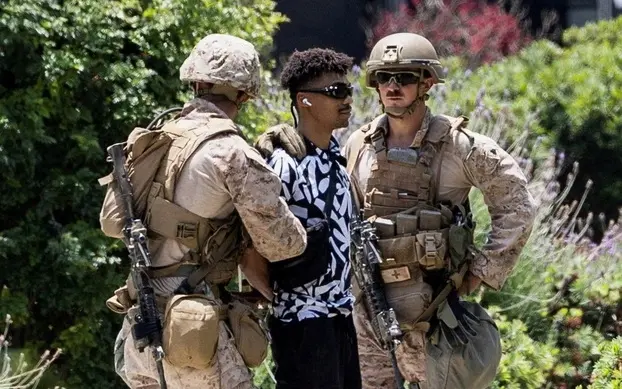Vatican News

Objections from US Bishops
Earlier, Cardinal Blaise Cupich of Chicago spoke out against any mass deportation of immigrants, even before President-elect Donald Trump was sworn in. Next, Bishop Mark Joseph Seitz of El Paso emphasized zero tolerance for all forms of injustice. Finally, the entire U.S. Conference of Catholic Bishops expressed shock at the measures announced by the Republican leader, including the repatriation of millions of illegal immigrants and the militarization of the U.S.-Mexico border.
Now, the Holy Father himself has spoken out about the “significant crisis unfolding in the United States due to the launch of the mass deportation program” implemented by the new administration shortly after the President took office. Pope Francis, who is closely following this crisis, has written to the US Bishops to express his closeness and support in the “sensitive moment” they are experiencing as pastors accompanying the People of God, while condemning some measures that are offensive to human dignity. He warned: “What is built on force, and not on the truth about the equal dignity of every human person, starts badly and ends badly.”
Damage to human dignity
In the letter, which is divided into 10 points, the Pope wrote: “The expulsion of people who in many cases have left their homelands because of extreme poverty, insecurity, exploitation, persecution or serious deterioration of the living environment, offends the dignity of many men and women, and of entire families, and leaves them in a situation of particular vulnerability and defenselessness.” The letter, published in English and Spanish, comes just over two weeks after the White House posted on its X account photos of a group of migrants handcuffed and led onto a military plane for repatriation.
Right to community protection
In the letter, the Holy Father stressed that “an upright conscience cannot fail to express a critical judgment and express its disagreement with any measure, implicitly or explicitly, that equates the illegal status of some migrants with criminality”. However, he also reiterated the need to recognize “the right of a State to protect itself and its community from those who have committed violent or serious crimes while in the country or before arriving there”. But the act of expulsion remains a wound to human dignity, that “infinite and transcendent” dignity bestowed by “God who is close, incarnate, migrates and flees”. The Holy Father quoted Pope Pius XII in the Apostolic Constitution on Aid to Migrants, considered the “ Magna Carta of the Church’s thinking on migration”: “The Holy Family of Nazareth in exile, Jesus, Mary and Joseph, who migrated to Egypt and sought refuge there from the wrath of an unjust king, are an example and a comfort to migrants and itinerant people of every age and nation, to all refugees of whatever condition, who are persecuted or forced by difficult circumstances to leave their homeland, their beloved family and friends and to go to a foreign land”.
Treat everyone with dignity
The Pope affirms that this is not a secondary issue: “A true State governed by law is expressed in the dignified treatment that everyone, especially the poorest and most marginalized, deserves”. He writes: “The true common good is promoted when societies and governments, with creativity and strict respect for the rights of all – as I have said on many occasions – welcome, protect, promote and integrate the weakest, the most defenseless and the most vulnerable”. This does not prevent the promotion of “a policy that regulates orderly and regular migration”, provided that it is not built “through the privileges of some and the sacrifices of others”.
Looking at regulations in the light of human rights
The Holy Father reminded the Bishops that Jesus Christ teaches us about the “permanent awareness” of the dignity of every human person: “No one is excluded”. Therefore, he stressed, “all Christians and people of good will are called to see the legitimacy of public regulations and policies in the light of human dignity and fundamental human rights, and not the other way around”. Moreover, Christians know well that “only by affirming the infinite dignity of every person can our identity as individuals and as communities mature”. “The human person is not simply an individual, with a few humane feelings! The human person is a dignified subject who, through a constitutive relationship with all, especially the poorest, can gradually mature in his or her identity and vocation”.

The order of love
In the letter, the Pope also refers to the principle of “ ordo amoris ” (order of love) developed in the theology of St. Augustine, which affirms that everyone and everything should be loved in the proper way. This concept was recently invoked by Vice President JD Vance to justify measures against illegal immigration in the United States. “The order of authentic love that needs to be promoted is the order that we discover when we meditate continually on the parable of the ‘Good Samaritan,’ that is, on the love that builds a fraternity open to all, without exception,” the Pope concludes. “Concern for personal, community or national identity that ignores these considerations easily leads to an ideological standard that distorts social life and imposes the will of the powerful as a criterion of truth,” the Pope concludes.
Say no to stories that discriminate and cause suffering
The Holy Father expressed his closeness to his brother Bishops in the United States, noting their “precious efforts” in their commitment to be “close” to migrants and refugees, as well as in defending human rights. He affirmed: “God will richly reward all that you do to defend and protect those who are considered less valuable, less important or less dignified!” At the end of the letter, the Holy Father called on all Catholics and all people of good will “not to give in to narratives that discriminate and cause unnecessary suffering to our migrant and refugee brothers and sisters”. He said: “With charity and clarity, we are all called to live in solidarity and fraternity, to build bridges that bring us closer to one another, to avoid the walls of shame, and to learn to offer our lives as Jesus Christ offered them, for the salvation of all.”
Prayer to the Virgin of Guadalupe
Finally, the Holy Father prayed to the Virgin Mary of Guadalupe, Patroness of Mexico, asking her to “protect those people and families who are living in fear or suffering because of migration and/or expulsion.” He prayed that “ Morenita ” (the affectionate name of Our Lady of Guadalupe) would help everyone “take a step forward in building a more fraternal, more tolerant and respectful society for all.”
Thank you for reading this article. If you would like to receive newsletters via email, please subscribe by clicking here.





